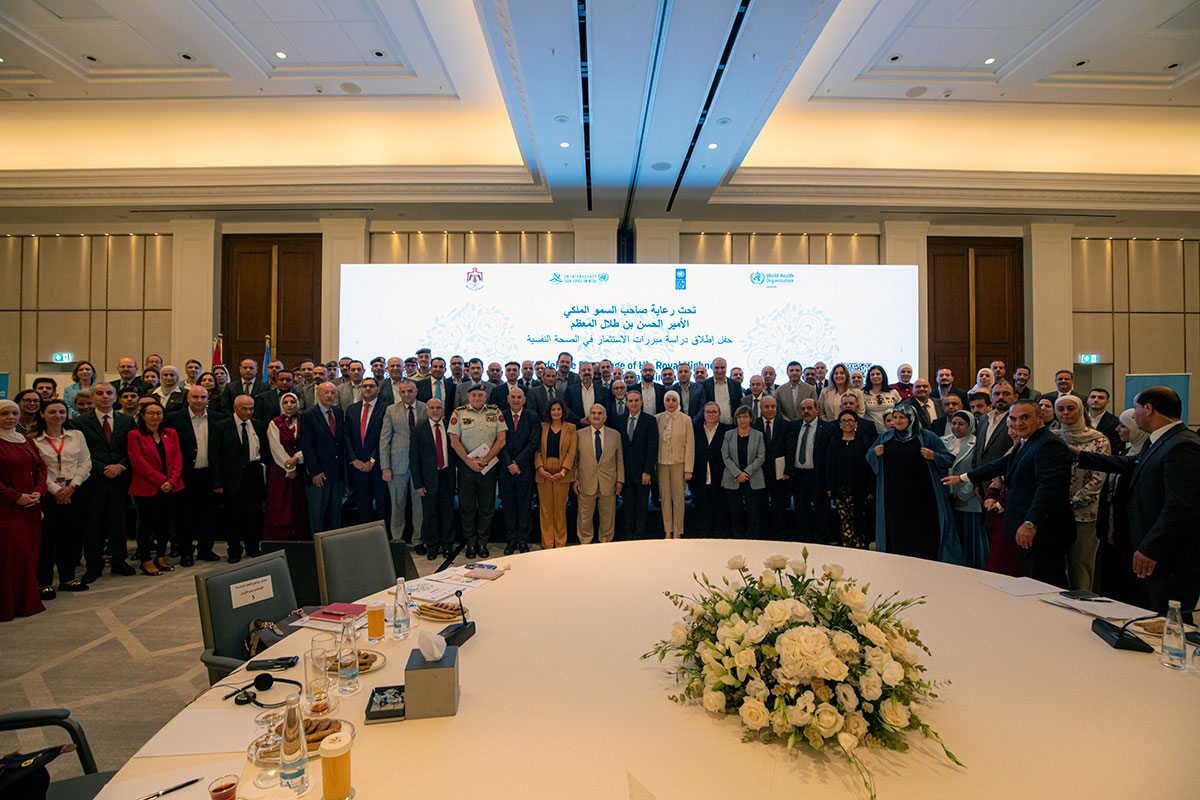 Amman, Jordan, 3 September – Under the patronage of HRH Prince El Hassan bin Talal, the Ministry of Health, in collaboration with the World Health Organization (WHO), launched Prevention and management of mental health conditions in Jordan: the case for investment, marking the start of a new phase in supporting mental health.
Amman, Jordan, 3 September – Under the patronage of HRH Prince El Hassan bin Talal, the Ministry of Health, in collaboration with the World Health Organization (WHO), launched Prevention and management of mental health conditions in Jordan: the case for investment, marking the start of a new phase in supporting mental health.
The investment case study, which was led by the Ministry of Health in close collaboration with WHO, the United Nations Development Programme (UNDP) in Jordan and the United Nations Inter-Agency Task Force for the Prevention and Control of Noncommunicable Diseases (UNIATF), highlights the urgent need for increased investment in mental health.
The study reveals the economic burden of mental health disorders: in 2023 alone, it was was estimated at 251.8 million Jordanian dinars (JOD), equivalent to 0.75% of Jordan’s GDP. This includes JOD 53.1 million in direct health care spending and JOD 198.7 million in indirect costs, including lost productivity due to premature death and disability. The numbers are not just statistics. They represent lost opportunities to build a brighter future.
The study details the burdens mental illness places on the individual and society. Individuals can become socially isolated, straining their family and other relationships. People with mental health problems also face social stigma which can prevent them from seeking treatment or talking about their problems, leading to increased feelings of separation.
 HE the Minister of Health Professor Feras Hawari said: “Despite the challenges, the Ministry, in partnership with the governmental, military and private health sectors and in cooperation with the WHO, continues its efforts to enhance and raise the efficiency of the national mental health system which includes a set of initiatives and programmes that aim to improve and expand the scope of services provided and facilitate access to them as we seek to achieve comprehensive health coverage for all, including people with mental health conditions.”
HE the Minister of Health Professor Feras Hawari said: “Despite the challenges, the Ministry, in partnership with the governmental, military and private health sectors and in cooperation with the WHO, continues its efforts to enhance and raise the efficiency of the national mental health system which includes a set of initiatives and programmes that aim to improve and expand the scope of services provided and facilitate access to them as we seek to achieve comprehensive health coverage for all, including people with mental health conditions.”
Dr Jamila Al-Raiby, WHO Representative to Jordan, called for the transformation of mental health care: “The presence of all partners today is a real start of efforts to integrate mental health services into primary health care, and of working together so that everyone can access and obtain high-quality health care at affordable prices. It is also a real opportunity to reject stigma and discrimination around mental health diseases and disorders.”
The study provided a comprehensive assessment of the mental health landscape in Jordan, detailing the challenges facing development of the system alongside opportunities to do so. It focused on 6 mental health conditions – psychosis, bipolar disorder, depression, anxiety disorders, alcohol use disorders and epilepsy. By evaluating the costs of therapeutic interventions, including school-based interventions to prevent depression and suicide, the health gains and economic benefits, the report provides a clear picture of where investments should be made.
The launch of the study comes within the framework of the WHO Director-General's Special Initiative for Mental Health. Jordan is one of nine countries implementing the Special Initiative, the goal of which is to expand the coverage of mental health services and facilitate access to them.
On the occasion of the launch, UNDP Representative in Jordan Randa Abu Al-Hosn stressed the importance of enhancing the roles of the private and insurance sectors in supporting and developing mental health in Jordan by providing the funding and tools to raise the quality of services provided and expand their scope.
“The objectives of this report are in line with UNDP’s commitment to supporting the Jordanian Government’s efforts to encourage investment in developing infrastructure, treatment services and innovative insurance products to improve mental health to accelerate social and economic development in Jordan,” said Abu Al-Hosn.
The launch event included a dialogue session during which experts discussed the study’s recommendations, next steps and the role of partner agencies in implementing the proposed investment solutions to improve the status of mental health in Jordan, enhance care services and integrate them into the primary health care infrastructure.


